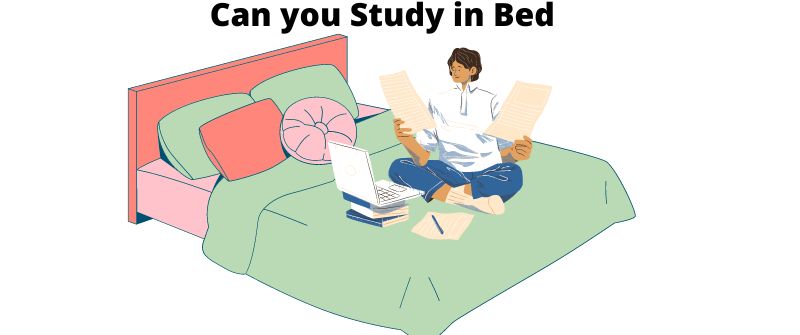Can you Study in Bed? Benefits and risks to avoid

While it is possible to study in bed, it may not be the best idea for several reasons.
Firstly, studying in bed can lead to a lack of focus and productivity. Your bed is a place that you typically associate with relaxation and sleep, so it can be challenging to maintain the level of concentration necessary to study effectively.
Secondly, studying in bed can also disrupt your sleep cycle. If you associate your bed with work or studying, it can be difficult to mentally switch off when it’s time to sleep. This can lead to a lack of quality sleep, which can impact your overall health and well-being.
If you do decide to study in bed, it’s essential to set up a comfortable workspace that supports good posture and reduces the risk of discomfort or pain. Additionally, you should ensure that your study area is free of distractions, such as electronic devices or other stimuli that may disrupt your focus.
Why you shouldn’t Study in Bed
There are several reasons why studying in bed is not generally recommended. Here are some of the main reasons:
1. It can decrease productivity and focus
When you study in bed, you may associate the bed with relaxation and sleep, which can make it harder to focus on your work. In these days, I cannot focus at all.
In addition, you may also be more likely to get distracted. At the same time, it can cause falling asleep while studying as you try to get things done.
2. It can lead to poor posture and discomfort.
When you study in bed, you may tend to hunch over or slouch, which can put a strain on your neck, shoulders, and back. This can cause discomfort and pain over time.

3. It can disrupt your sleep patterns
If you study in bed, your brain may associate the bed with work and stress, which can make it harder to fall asleep at night.
This can lead to sleep disturbances and a lack of quality sleep, which can impact your overall health and well-being.
4. It can increase the risk of repetitive motion injuries
If you study on a laptop or other electronic device in bed, you may be at risk of developing repetitive motion injuries such as carpal tunnel syndrome or tendinitis due to the lack of proper ergonomics and support.
5. It can be unsanitary.
Your bed is typically used for sleeping, and it may not be the cleanest or most sanitary place to study. There may be dust, allergens, or other contaminants that can exacerbate allergies or respiratory problems.
Overall, it is generally recommended to create a designated study area that is separate from your sleeping area to promote better focus, productivity, and sleep hygiene.
Benefits of Studying in Bed
While it is generally not recommended to study in bed due to potential negative effects on productivity and sleep, there may be some benefits to studying in bed in certain situations.

One benefit is comfort. Studying in bed can be comfortable, especially if you have a supportive pillow and a comfortable mattress. This can make it easier to relax and focus on your studies without distractions from physical discomfort.
Another benefit may be privacy. If you share a room or living space with others and don’t have a private study area, studying in bed can provide a degree of privacy. You can use headphones to listen to audio lectures or study materials without disturbing others in the room.
Finally, some people may find that studying in bed helps them to relax and destress. If you are feeling particularly anxious or stressed, studying in bed may help you feel more calm and more comfortable.
It’s important to note, however, that these potential benefits may not outweigh the potential negative effects of studying in bed, such as decreased productivity and disrupted sleep patterns. It’s generally recommended to create a designated study area that is separate from your sleeping area to promote better focus and sleep hygiene.
Does Studying in Bed hurt
Studying in bed can potentially cause physical discomfort or pain if you don’t have proper posture or support. When you study in bed, you may tend to hunch over, which can strain your neck, shoulders, and back. Additionally, if you don’t have adequate support for your head, neck, and back, it can cause discomfort or even pain.
Repetitive motion injuries are also a concern when studying in bed, particularly if you are using a laptop or other electronic device.
The lack of proper ergonomics and support can put you at risk of developing conditions such as carpal tunnel syndrome or tendinitis.
Furthermore, studying in bed can also lead to sleep issues, as it can disrupt your sleep patterns and make it difficult to fall asleep. This can result in daytime sleepiness, decreased focus, and reduced productivity.
To prevent discomfort and potential pain, it is recommended to set up a designated study area that provides proper support and ergonomics.
If you must study in bed, use a supportive pillow and try to maintain good posture while studying. Take frequent breaks to stretch and move around to avoid developing pain or stiffness.
How to Stop Studying in Bed
If you’re finding it difficult to break the habit of studying in bed, here are some strategies that can help:

- Set up a designated study area. Creating a separate study area can help you establish a mental separation between work and relaxation. This can help you focus better and reduce the temptation to study in bed.
- Use a comfortable chair and desk. If you have a comfortable chair and desk, you’ll be more likely to want to use them for studying. Make sure your study area is ergonomically set up to reduce the risk of pain or discomfort.
- Establish a routine. Set a regular time and place for studying each day to establish a routine. This can help you build a habit of studying in a specific location, and it will help you stay on track with your studies. Also, avoid studying all night as it may not be effective.
- Use a timer. If you find it difficult to stay focused while studying, try using a timer to break up your study sessions. Take short breaks to stretch or walk around, then return to your work refreshed and focused.
- Eliminate distractions. Keep your study area free of distractions such as your phone or other electronic devices. This will help you stay focused and avoid the temptation to switch to studying in bed.
- Associate your bed with sleep. Make a conscious effort to use your bed only for sleeping and relaxation. This will help your brain associate the bed with rest, which can help you fall asleep more easily at night.
By implementing these strategies, you can create a more effective study routine and reduce the risk of negative effects associated with studying in bed.

